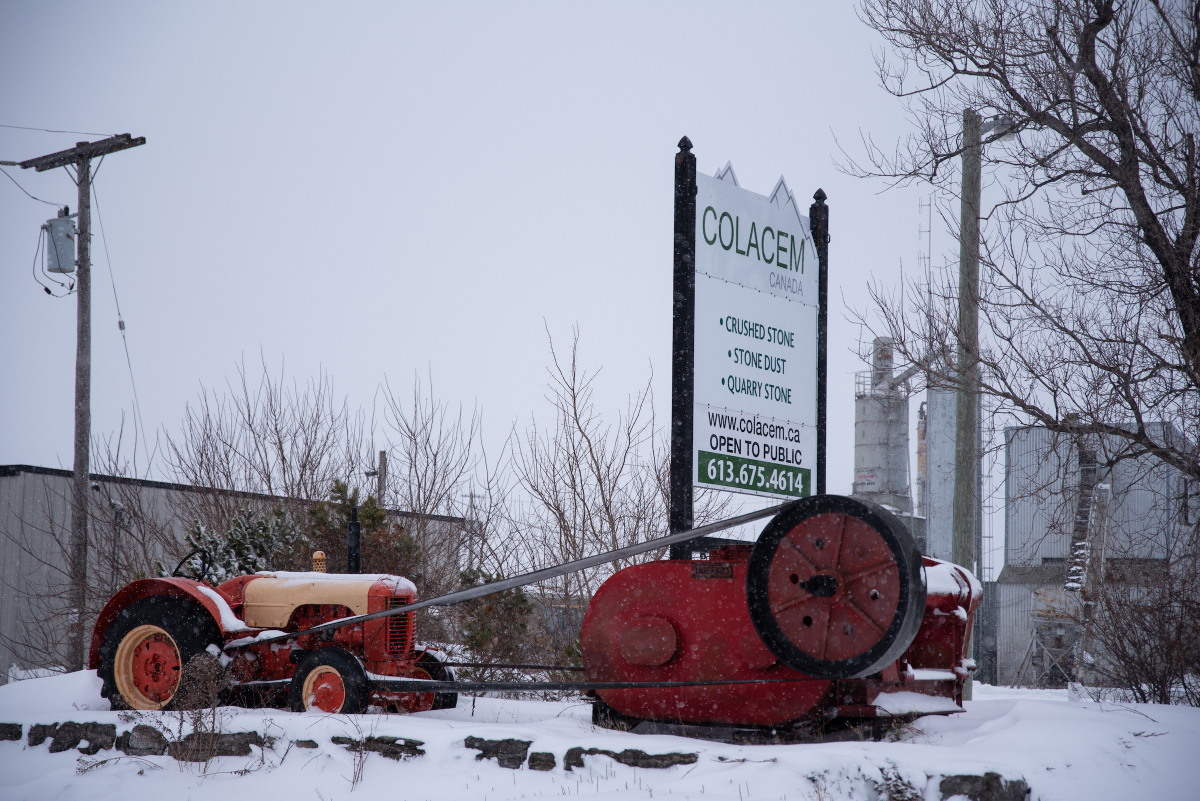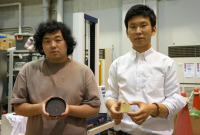Support strong Canadian climate journalism for 2025
For more than a decade, a proposal to build a cement plant has hung over one rural Ontario village like a black cloud.
In 2011, Colacem Canada Inc. announced the construction of a cement plant consisting of 52 buildings beside its quarry in Champlain Township, less than 100 kilometres east of Ottawa.
Operating around the clock and producing over a million tonnes of cement annually, the plant would also generate nearly 833,000 tonnes of planet-heating carbon dioxide pollution every year, equivalent to putting another 175,000 cars on Canada’s roads, according to Colacem’s numbers.
Colacem’s data also show the plant would release 20 tonnes of 70 different pollutants, many classified as carcinogenic or toxic by the federal government, including lead, mercury and benzene.
Now, opponents of the project are holding onto hope that the final federal agency to have a say in its construction will stop Colacem in its tracks. The Department of Fisheries and Oceans must approve the cement plant’s activities around the Ottawa River before construction can go ahead.
Gary Champagne, an organizer with Action Champlain, a community non-profit that has raised more than $400,000 and amassed thousands of supporters to battle the proposal, says the vast majority of Champlain Township is opposed to the plant.
“We collected written responses from hundreds of attendees at public meetings,” says Champagne, adding most of those individuals were against the project.
Already subjected to pollution from the Colacem quarry and a nearby steel mill, residents expressed concern for the health of the air, water and farmland in one of the most agriculturally rich regions of Canada.
Residents oppose plant's construction
To build the cement plant, Colacem needs regional government approval to rezone the proposed site for heavy industrial activities.
All three municipalities downwind from the plant’s 124-metre-tall kiln chimney — and thus its emissions — voted against the rezoning. But they were outnumbered by the other five townships and municipalities that make up the United Counties of Prescott and Russell (UCPR), and in 2017, the zoning amendment was approved.
Action Champlain appealed the decision to the Ontario Land Tribunal in 2020 but lost. “Our hands at the municipality and counties are tied,” says Champlain Township mayor and UCPR warden Normand Riopel. “Nothing is going to change the fact the zoning amendment was allowed.”

For Champagne, it felt like a violation of the democratic process.
“It says a lot about the value we give to the voice of the people,” says Champagne.
Grand Chief Victor Bonspille of the Mohawk community of Kanesatake, 50 kilometres downstream, is also opposed to the project. Colacem never adequately consulted with First Nations, Bonspille argues. In December 2022, the grand chief sent letters to federal Environment Minister Steven Guilbeault and Ontario Environment Minister David Piccini stating both are in “breach of their constitutional duties to consult.”
Former grand chief Simon Serge attended public meetings with Colacem and the UCPR, but Bonspille says that does not necessarily constitute federally mandated consultations.
Province approved despite errors
Colacem also got environmental approval from Ontario’s Ministry of the Environment, Conservation and Parks, despite errors the company made on its application.
Golder Associates, the consulting firm hired by Colacem to prepare the environmental submission, used U.S. short tons, not metric tonnes, resulting in a 10 per cent underestimation of CO2 emissions from the plant, according to the Ontario Land Tribunal ruling against Action Champlain’s appeal.
Other errors included calculating the plant’s operating hours at 10 hours a day instead of the stated 24, not including emissions from quarry operations and failing to consider emissions from truck and machinery traffic.
Several phone calls and emails sent to Colacem and a company with the same owner, Beton Provincial, received no response before publication.
In an open letter to then-Ontario environment minister Jeff Yurek in 2021, Francis Drouin, MP for Glengarry-Prescott-Russell, and Amanda Simard, former MPP for the same riding, noted the errors and asked that the province’s environmental approval be revoked.
“It’s hard to believe a mistake like this could be made when an entire team of professionals was at the disposal of the proponent of this project,” wrote Drouin and Simard. “We hope this was not done intentionally to show a lower concentration of kiln pollutants emitting from Colacem.”
The province brushed off the errors. The ministry has “reviewed and accepted” Colacem’s proposed solutions for the errors, and is satisfied the “facility can be constructed and operated in accordance with ministry requirements,” Environment Ministry spokesperson Lindsay Davidson said.
But Stephen Hazell, former director of policy and general counsel for Nature Canada, says Ontario’s regulations don’t go far enough to rein in industrial greenhouse gas emissions or pollution.
“There is no guarantee that Colacem will be doing a goddamn thing more than they want to do,” says Hazell.
Ottawa says federal oversight not warranted
Environmental groups have appealed to the federal government twice since 2018, asking Ottawa to conduct its own environmental assessment of the project. Both requests were declined, saying the provincial oversight in place was sufficient.
In a statement to Canada’s National Observer, the Impact Assessment Agency of Canada says decisions under the old regulatory framework “continue to stand under the IAA (Impact Assessment Act),” and any consideration must consist of new important information regarding potential adverse impacts.
Despite the declined requests for a federal assessment, Champagne believes there is still a chance the plant can be blocked. Action Champlain continues its campaign against Colacem and is exploring new legal avenues to stop it.
“I still have hope the plant won’t be built,” says Champagne. “It’s still our goal to put an end to this project, and we’re not giving up.”





Comments
Producing cement is not only bad for the population of Champlain, it's bad for the entire planet. Concrete will continue to be used widely around the world, but we have to find ways to minimize its impact on people and the environment.
I highly recommend people to read a paper written by Joe Zadeh: "Concrete Built the Modern World. Now It's Destroying It." (noemamag.com) suggested by Chris Hatch (Zero Carbon, 2023/01/15). There is also a very surprising and quite shocking documentary that I invite you to watch called "Sand Wars" (available for free on Kanopy if you are a member of a public library).
In terms of carbon, I think there are some new technologies that have been/are being developed that don't emit. The longer they stall, the better the chance of any plant that goes forward using one of those approaches.
But there are a lot of other issues, which have more localized and direct effects, and I don't think new technologies do much for those. Carbon or no carbon, local people still get poisoned, watersheds could still be impacted and so on. I expect there are ways to minimize that kind of thing--but they cut into profits so companies will never be willing to use them.